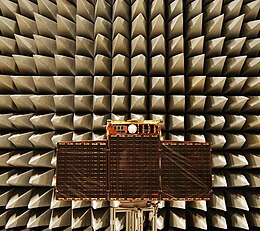TET-1
This article needs additional citations for verification. (July 2012) |
 TET-1 undergoing testing | |
| Mission type | Technology |
|---|---|
| Operator | DLR |
| COSPAR ID | 2012-039D |
| SATCAT no. | 38710 |
| Spacecraft properties | |
| Manufacturer | Kayser-Threde GmbH |
| Start of mission | |
| Launch date | 22 July 2012, 06:41 UTC[1] |
| Rocket | Soyuz-FG/Fregat |
| Launch site | Baikonur 31/6 |
| End of mission | |
| Last contact | 17 November 2022 |
| Decay date | 18 November 2022 |
| Orbital parameters | |
| Reference system | Geocentric |
| Regime | Low Earth |
TET-1 (German: Technologieerprobungsträger 1, Technology Experiment Carrier) was a microsatellite operated by the German Space Operations Center of the German Aerospace Center. It was the centre of the OOV (On Orbit Verification) Program, initiated to offer on-orbit verification possibilities to the German industrial and scientific aerospace community.[2] TET was based on the satellite bus used for the BIRD satellite, which was launched in 2001.[3]
The main contractor for Phase A (feasibility) was IABG. The final contract for Phases B, C, and D (definition/qualification, and production) and start was given to Kayser-Threde GmbH, a medium-sized aerospace company based in Munich belonging to the German OHB-System group. The environmental qualification was successfully conducted in the IABG space simulation centre in Munich.
TET-1 was carried to orbit as a secondary payload on a Soyuz-FG/Fregat carrier rocket which was launched from the Baikonur Cosmodrome on 22 July 2012.[1] The primary payload of the launch was the Kanopus-V1 satellite, with the BelKA-2, Zond-PP and exactView-1 satellites also flying on the same rocket.
After 10 years in orbit, the TET-1 satellite re-entered into the atmosphere on 18 November 2022.[4]
References
[edit]- ^ a b Bergin, Chris (22 July 2012). "Russian Soyuz-FG successfully launches five satellites". NASASpaceflight.com. Retrieved 22 July 2012.
- ^ "Das On-Orbit-Verifikations-Programm" [The On-Orbit-Verification-Program]. DLR Portal (in German). DLR. Retrieved 2022-11-24.
- ^ "In-Orbit Verification". OHB. OHB-System AG. Retrieved 2022-11-23.
- ^ "Abschied vom Technologie-Erprobungsträger (TET-1)" [Farewell to the technology test vehicle (TET-1)]. DLR Portal (in German). DLR. 2022-11-21. Retrieved 2022-11-23.
